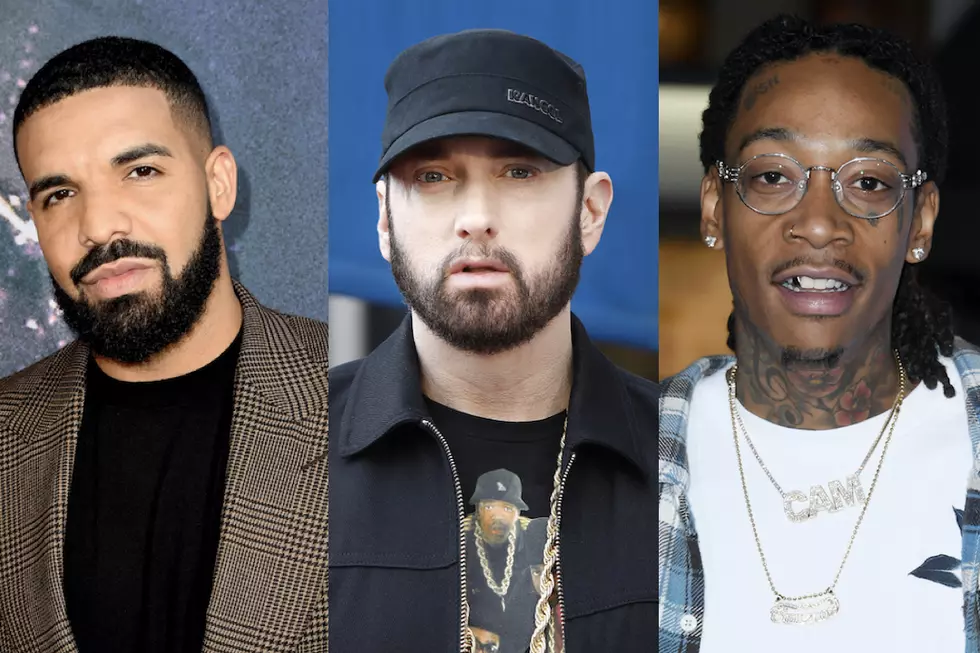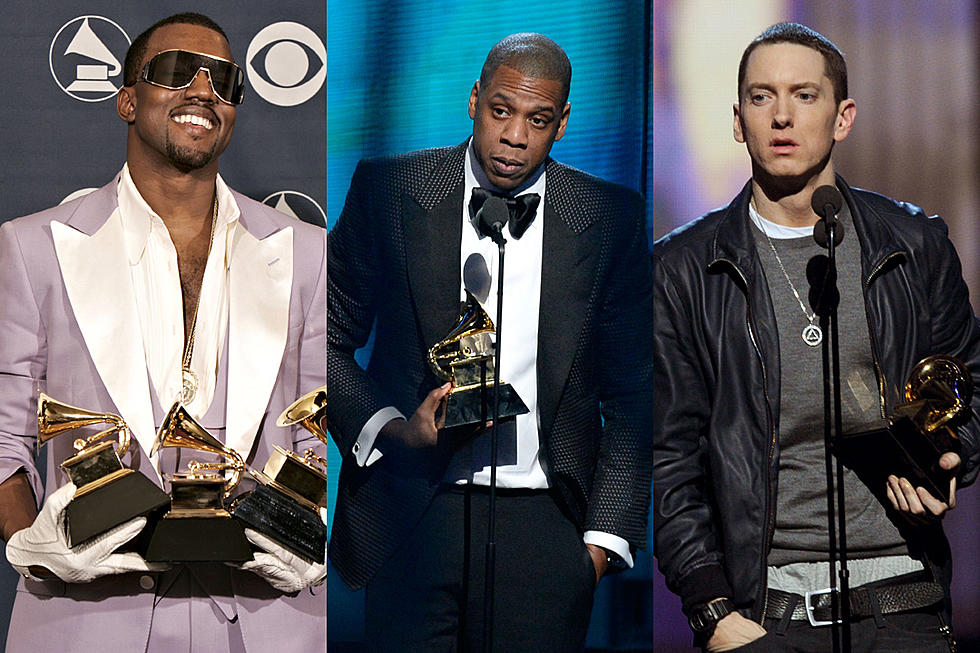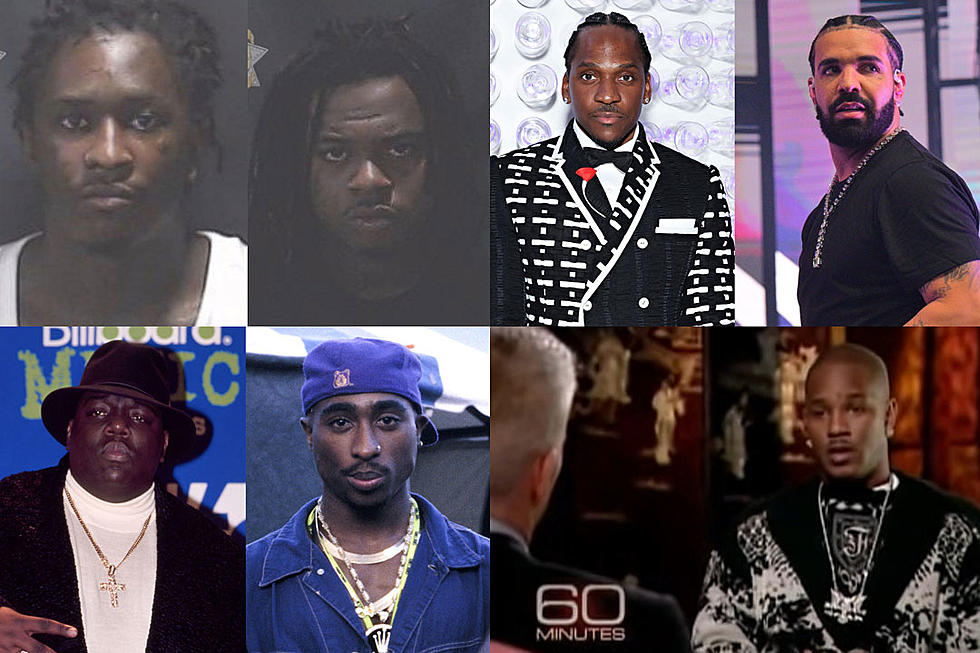
Macklemore & Ryan Lewis Respond To Critics: “It’s Bullshit”
It's been a whirlwind of a year for Seattle's Macklemore and Ryan Lewis. After appearing on XXL's 2012 Freshmen Class cover, Macklemore set out to release the duo's studio debut, The Heist, independently. The album enjoyed a successful debut, pushing nearly 80,000 units in its first week thanks to Mack and Ryan's years of building a widespread and ardently devoted fan base. But then something unexpected happened: Macklemore and Ryan Lewis blew up.
Heist's fourth single, "Thrift Shop," picked up momentum six weeks after its official release in August 2012 and quickly (thanks to an extremely catchy beat and viral video) began climbing the ranks of the Billboard Hot 100. By early 2013, "Thrift Shop" was dominating the charts, holding onto the No. 1 spot for 16 weeks straight and selling 6 million copies. The single's success helped The Heist sell upward of 700,000 copies to date, making it one of the most successful independent album releases in hip-hop.
At a recent performance at Pennsylvania's Lafayette College—the last stop on the pair's lengthy college tour—Macklemore and Ryan Lewis sat down with XXL to catch us up on their blur of a year. After an exhausting hour-long performance that was nearly cancelled due to turbulent weather conditions, the duo chopped it up about the success of "Thrift Shop," maintaining their creative independence and dealing with criticism about their ubiquitous crossover single.
XXL: Since the release of The Heist, you guys have charted two No. 1 singles with "Thrift Shop" and "Can't Hold Us." Has your success made you have a "See, I told you so" feeling toward the industry?
Macklemore: That's exactly what it is, like, "See? I fucking told you!" [Laughs] No, for us, it was more like, "Damn, that happened?" All of this was an extreme surprise, so we haven't really had that moment. It's cool that somebody could even look at it that way, but I think the thing that's been underestimated with our music is its connection with people. The connection it has on a personal level, people just don't value that. I read shit, and people don't get it. They don't understand that it's resonating with people on a personal level, and when music infiltrates the spirit it has a power way beyond any normal club record or flavor of the month. It has lasting power, and that's why The Heist is still selling 30,000 records a week seven months after it came out, which is more than I thought it was gonna do its first week.
One of the songs that really stood out to me on The Heist was "Jimmy Iovine." How true is the story behind that song?
Macklemore: Since releasing the song, we met with Jimmy Iovine to chop it up. Me and my manager went in and kicked it with him for a couple hours, but for the song we didn't meet with him. We'd met with numerous other people in the industry who were offering us deals, and we did the shake hands, eat a meal, play records, awkward situations. All of those experiences kind of accumulated into the song "Jimmy Iovine." And my whole life I was like, "I want to get a deal. That's the only way you can be on and be famous is sign a deal." That was the epitome of success for me, but I think that as Ryan and I continued to put out music and really set our own lane, it became obvious that we didn't need what a label had to offer. That's really what the story of that song is: me stealing this record deal, this kind of fictitious record deal, and realizing that I don't even want it now that I'm here. But Jimmy was super cool. He had a lot of great things to say. The reason we picked him was because he's like that dude in the industry, but he turned out to actually be a good person.
You guys have created a unique brand. What advice would you give to up-and-coming artists who are hoping to create a brand of their own?
Ryan Lewis: I would say, first and foremost, even if it's a cliche, to work extremely hard. I don't think you get anywhere without logging hours and becoming extremely good at your craft. I also think that if you're going the independent route, there's so many different things to fulfill to operate your camp, from the design of your album to your visuals, your photography, your merchandising. All of those different things are reflective of your artistry beyond the music, and that's where I think labels often times fall short. You might have a great record and then you bring it to a label and it goes to their graphic design department and your whole branding and the way that you visually look sucks. I would tell independent artists to start filling in those pieces that make a huge difference in terms of your general impression on listeners.
Mack, there was a NY Times article that came out in February that talked about you and Baauer and your chart-topping success. In the article, Jon Caramanica wrote, "Macklemore’s success is a reminder that in 2013 it is possible to consume hip-hop while remaining at a far remove from the center of the genre." What's your response to that?
Macklemore: Well, that sounds like it's coming from a thirtysomething-year-old white man, and they tend to be bitter and cynical. I think that we as humans who have grown up listening to hip-hop music, hip-hop is a certain thing to us. For me, the "pure" hip-hop is the Golden Era. That's what brings back that nostalgia, that feeling of being a kid and connecting with music, like, "This is the real shit. Everything else is fake," and it goes through all these different phases. But you had Puffy come out with the shiny suit after that, and then it was like, "Oh, hip-hop is dying. What is this?" Then it was like, "Oh, the skinny jeans! Skinny jeans are fucking killing hip-hop! That's what's the matter with music, is these fucking skinny jeans." And now it's Macklemore and Ryan Lewis, and now it's really over.
But that's bullshit. I think that the dude who wrote that probably hasn't listened to the whole album. When a song like "Thrift Shop" becomes a part of popular culture and soccer moms are bumping it and 5-year-olds are singing, "This is fucking awesome," it's really easy to go in with a scalpel and dissect it and scrutinize the shit out of it. If it was somebody else who made the song, I'd probably do the same thing, particularly if it was two white dudes. But I still think "Thrift Shop" is a really great record. I think that the beat's slapping, I think that I'm rapping my ass off, and I think that it has a really catchy chorus, and those things came together and made a record that crossed over to pop. But we made a song about secondhand clothes; it's about thrift shopping. How is that…there was no mass plan, like, "We are going to take over the industry by making a song about clothes that smell like piss!" That's a horrible marketing scheme. [Laughs] But in terms of that writer and in terms of anybody else who says anything like that, I understand. I am that guy, too, and I do view music in that same way, but I think it's narrow-minded and I would encourage people to listen to the full record before typecasting us and putting us in a box.
With hip-hop turning 40 this year, why do you think we're still having arguments about authenticity?
Macklemore: I think that it's because we hold on to what is true to us. Because of that, there's this mold, this "perfect record," and there is a right and a wrong. The older that we get, the more jaded that we get, so it's like, "Oh, Soulja Boy is the cause of music being whack. He's the person that's ruined it, but this right here is the truth." It's night and day; it's people being close-minded to change and not being able to adapt to what's popping now. As I've said before, I've been that person. I think that the smart person that has longevity in this industry is someone who studies what is current, studies what is relevant and studies what the kids are gravitating toward.
Ryan Lewis: Or on the flip side of that is looking to make what is current. That's why I think somebody like Kanye is absolutely phenomenal, because he continues to come out with something that nobody else has and he redefines what the standard is to an acceptable hip-hop beat or an acceptable cadence or subject matter. It's the reason why he is a trailblazer in the genre.
Macklemore: When you see people who have longevity in this industry, it's people who reinvented themselves. Jay-Z, although Reasonable Doubt is one of the greatest hip-hop albums of all time, Jay-Z hasn't made 15 Reasonable Doubts. Some people wish that he would, but people evolve, artists evolve, and music evolves. There's old fools arguing against the new fools and blaming them for shit they shouldn't be blamed for. There's always going to be the debate. With every Macklemore and Ryan Lewis, there's gonna be people that are like, "This isn't the true shit," but there's also gonna be people like, "You know what? Let me find out and investigate myself, find some validity in it," and then there's gonna be some people like, "This is the truest shit." Maybe in 10, 15 years, they're going to be like, "This shit's whack. I wish their music would get back to that Heist album." That's the cycle of hip-hop, that's why we argue, that's why we make lists, that's why we say this person's the best MC and then fools call up and get pissed about it and our egos flare up. That's what hip-hop is—this ego-driven, testosterone-filled, machismo melting pot of culture. That's the argument right there, and there's beauty in that.
More From XXL









